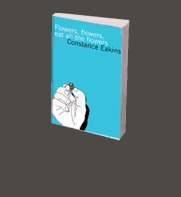Eakins’s Final, Unfinished Work
It
has long been rumored that Eakins, at the time of his disappearance,
was just about to embark on his most ambitious project yet—a
novel (or perhaps a memoir) that he called “The Mayor’s
Tongue.” He had mentioned this project at several occasions
throughout his career, often by means of veiled references. In a
rare interview with Le Monde in 1966, Eakins mentioned writing “a
massive book about the aspirations of utopia, involving linguistic
theory and the private utopia that is my own life.” He did
not give a title for the book in that interview, but did mention
that the protagonist would be the mayor of his utopia, a “mad—even
criminally insane—monomaniac.”
In The Darkness and
the Dead, the writer Branson Rigor plots
a novel called “The Mayor’s Tongue,” which he intends
to be his crowning masterwork. At one point Rigor says that, in order
to concentrate fully on the project, he will have to disappear from
the world for many years. Many readers have speculated that Rigor
was meant to be a stand-in for Eakins himself, and that Eakins’s
disappearance in the Carso was the result of a deliberate decision
to create for himself the space and time sufficient enough to write
his own “Mayor’s Tongue.”
In both of Eakins’s
memoirs—Gashes and The
Man With Holes in His Cheeks—he refers to his autobiographical
project as a trilogy. At the end of The Man With Holes in His
Cheeks, he signs off, “To be continued—God Willing.” Many
believe that “The Mayor’s Tongue” was to be the
third and final book in the memoir trilogy.
In his final interview,
for a profile published in Rolling Stone in
1970, he said that he would soon begin the book he “had been
preparing [his] whole career to write.” The reporter asked
him whether this was the book that his fans referred to as “The
Mayor’s Tongue.” Eakins did not reply but, in the reporter’s
description, laughed “giddily.” He hinted, furthermore,
that he had already begun writing it. “There is a marvelous
peace in not publishing,” said Eakins. “I say that as
someone who has published prolifically ever since I was a teenager.
It’s peaceful not to publish. Quiet. Publishing is a terrible
invasion of my privacy. I write just for myself and my own pleasure.”
We
at Eakins Web support the theory that Eakins lives, in the Carso
or elsewhere, and continues to write his magnum opus, “The
Mayor’s Tongue,” to this day. The book will not come
to light, we suspect, until his death. And what a happy consolation
it will be on that tragic day to discover this greatest work of the
greatest writer who ever lived.
—Canseco Nástinke

